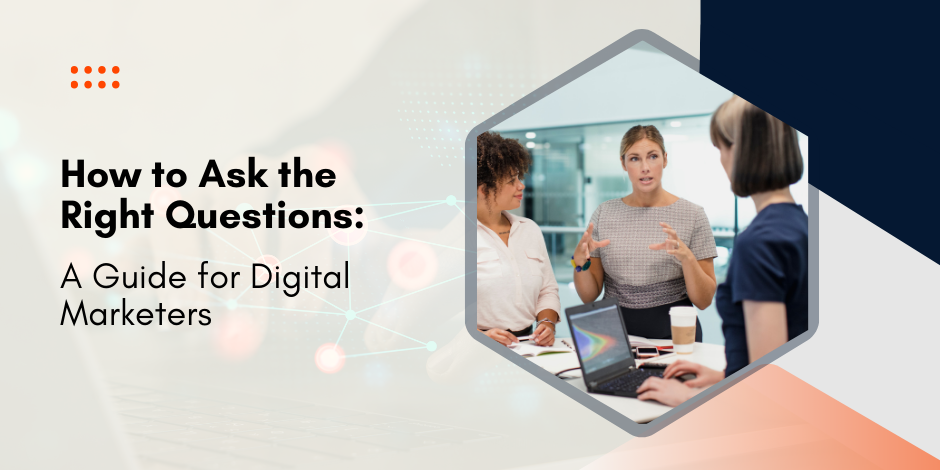How to Ask the Right Questions as a Digital Marketer

Stay Informed With Our Weekly Newsletter
Receive crucial updates on the ever-evolving landscape of technology and innovation.
In the world of digital marketing, knowing how to ask the right questions is essential for connecting with stakeholders.
It is through asking questions that digital marketers gain insight into our target audience, understand their needs, and shape our marketing strategies accordingly.
This guide will explore the importance of asking the right questions and provide tips on formulating effective questions for different digital marketing channels.
Why is it important to know how to ask the right questions as a digital marketer?

Asking the right questions is essential for digital marketers.
These questions serve as the starting point for gathering information and understanding the needs and preferences of their target audience.
By asking the right questions, digital marketers can uncover valuable insights that can inform their marketing strategies.
Asking the right questions is akin to unlocking a treasure trove of information that can guide marketers in creating impactful campaigns.
It is through these questions that marketers can delve deep into the psyche of their audience, gaining a nuanced understanding of their behaviours and preferences.
The role of questions in digital marketing
Questions act as a bridge between marketers and their target audience. They help us to gain a deeper understanding of our customers, their motivations, and their pain points.
By asking the right questions, digital marketers can uncover valuable insights that allow us to create more targeted and relevant marketing campaigns.
Moreover, questions not only provide digital marketers with insights into their audience but also foster a sense of connection and engagement.
When customers feel that a brand is genuinely interested in their opinions and needs, it can lead to stronger brand loyalty and trust.
The impact of well-crafted questions on marketing strategy
Well-crafted questions have a significant impact on marketing strategy.
By asking targeted and thought-provoking questions, digital marketers can gather data and gain insights that enable them to tailor their strategies to the specific needs and preferences of their audience.
This, in turn, leads to higher engagement, better conversion rates, and increased ROI.
Furthermore, the art of asking the right questions is a skill that requires finesse and strategic thinking.
Digital marketers must not only consider what questions to ask but also the timing and context in which they are posed.
This attention to detail can make all the difference in the effectiveness of a marketing campaign.
Identifying your digital marketing objectives
Before formulating questions, it is crucial to define your digital marketing objectives clearly. What do you want to achieve through your marketing efforts?
Setting clear and measurable goals is essential in guiding your question formulation process.
When considering your digital marketing objectives, it is important to delve deeper into the specific areas you wish to focus on.
Are you aiming to increase brand awareness, drive website traffic, generate leads, or boost sales? Each objective will require a tailored approach in terms of the questions you formulate and the data you seek to gather.
Setting clear and measurable goals
When setting digital marketing goals, it is important to ensure they are clear and measurable. Vague goals can make it challenging to formulate effective questions that will provide the necessary insights.
By defining specific and measurable objectives, digital marketers can better align your questions with your desired outcomes.
Furthermore, it is beneficial to establish key performance indicators (KPIs) that will help you track the progress towards your goals.
These KPIs can range from website traffic metrics to conversion rates, depending on the nature of your objectives.
Regularly monitoring these KPIs will enable you to make informed decisions and adjustments to your digital marketing strategies.
Aligning your questions with your objectives
Once you have defined your digital marketing objectives, it is time to align your questions with these goals.
Each question should be designed to provide insights that directly contribute to achieving your objectives.
By clearly mapping out the relationship between your questions and objectives, you can ensure that you gather the most relevant and actionable data.
Consider the specific information you need to gather to evaluate the success of your digital marketing campaigns.
Whether it is customer feedback, website engagement data, or social media analytics, tailoring your questions to capture these insights will be instrumental in refining your strategies and driving toward your objectives.
Formulating effective questions for digital marketers

When it comes to formulating questions for digital marketing, there are key strategies to keep in mind. Open-ended questions and specific, targeted questions are two effective approaches that yield valuable insights.
Understanding the psychology behind question formulation is crucial in the realm of digital marketing.
By delving into the intricacies of human behavior and cognitive processes, marketers can craft questions that resonate with their target audience on a deeper level.
This approach not only elicits more meaningful responses but also helps in building a stronger connection with customers.
The art of open-ended questions
Open-ended questions encourage respondents to provide detailed and thoughtful answers. These questions prompt individuals to share their opinions, experiences, and preferences, allowing marketers to better understand their audience.
Examples of open-ended questions include “What challenges do you face in relation to X?” and “How do you prefer to consume online content?”
Moreover, open-ended questions serve as a valuable tool for uncovering hidden insights and unearthing customer sentiments that may not be captured through closed-ended queries.
By giving respondents the freedom to express themselves openly, marketers can tap into a wealth of qualitative data that enriches their marketing strategies.
The power of specific, targeted questions
Specific, targeted questions are designed to obtain precise information. These questions enable marketers to gather quantitative data and insights that can be used for data-driven decision-making.
Examples of specific, targeted questions include “How often do you purchase products online?” and “Which social media platforms do you use the most frequently?”
Furthermore, the beauty of specific, targeted questions lies in their ability to provide marketers with clear-cut data points that can be analysed and interpreted with precision.
By asking direct questions that focus on specific aspects of consumer behavior, marketers can extract actionable insights that drive strategic marketing initiatives and enhance overall campaign performance.
Asking questions to understand your audience
Understanding your audience is crucial in digital marketing. By asking the right questions, you can gain valuable insights into their demographics and behaviour, allowing you to tailor your marketing efforts accordingly.
The importance of demographic questions
Demographic questions provide vital information about your audience’s age, gender, location, and other relevant characteristics. This data helps you create targeted marketing campaigns that resonate with specific demographic segments.
Examples of demographic questions include “What is your age range?” and “In which country do you reside?”
Behavioural questions to reveal customer habits
Behavioral questions delve into your audience’s habits, preferences, and purchase patterns. By understanding how your audience behaves, you can align your marketing strategies to effectively meet their needs.
Examples of behavioral questions include “How frequently do you purchase products online?” and “Which factors influence your purchase decisions the most?”
Utilising questions in different digital marketing channels

Questions can be effectively utilized across various digital marketing channels to engage your audience and gather valuable insights.
Tailoring questions for social media marketing
Social media platforms provide an excellent opportunity to engage with your audience through questions.
Utilise polls, surveys, and interactive content to encourage your followers to share their thoughts and opinions.
For example, asking questions like “What is your biggest marketing challenge?” or “What type of content do you enjoy most?” can provide valuable feedback and gauge audience sentiment.
Crafting questions for email marketing
Email marketing campaigns can also leverage questions to engage subscribers and gather data.
Including questions in newsletters or automated emails encourages recipients to provide feedback or share their preferences.
For example, asking questions like “What topics would you like us to cover in future newsletters?” or “How satisfied are you with our products and services?” allows you to gather valuable feedback and better tailor your email marketing strategies.
Conclusion
As digital marketers, asking the right questions is a powerful tool.
By understanding the importance of asking the right questions, identifying our objectives, and formulating effective questions, digital marketers gain invaluable insights into our target audience.
Leveraging these insights allows us to create more targeted and relevant marketing strategies that deliver optimal results.
Are you ready to launch your career in digital marketing?
If so, we encourage you to explore the Institute of Data’s Digital Marketing & Artificial Intelligence Program Outline.




